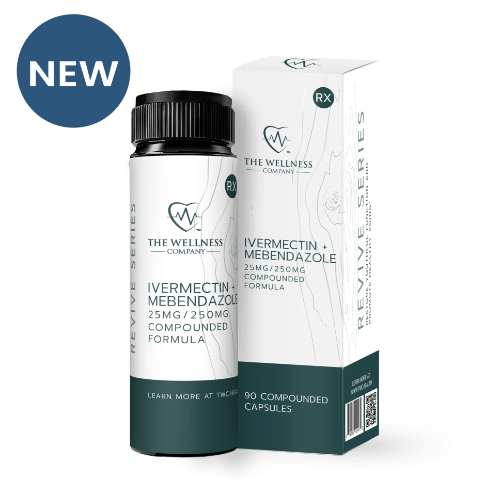Ivermectin and Mebendazole for Cancer: The Game-Changing Combo You Need to Know About (2025)
“All three of them don’t have cancer now — at all,” Gibson declared.
Not surprisingly, this sent shockwaves across the internet.
Suddenly, ivermectin — demonized during COVID — was back in the spotlight. But this time, not just as a parasite killer. Scientists are already looking into ivermectin’s potential to shrink tumors. And fenbendazole? It’s showing promise in laboratory studies against aggressive cancer cells.
Here’s where it gets interesting: Fenbendazole is an animal drug. But mebendazole, its FDA-approved counterpart for humans, is available NOW.
Is ivermectin and mebendazole the same thing?
What Is Ivermectin?
Ivermectin Effectiveness
- Ivermectin and breast cancer: Ivermectin has been found to turn cold breast tumors hot. Cold tumors mean there are little to no infiltrating T-cells. However, Ivermectin treatment led to robust T-cell infiltration, which turned the tumors into hot ones. This suggests that Ivermectin could synergize with proteins like the PD-1, which help the immune system by acting as a brake on T-cells. This will increase immunity and help the body eradicate cancer.
- Ivermectin and digestive system cancer: Clinical studies show that dose-dependant Ivermectin inhibits the proliferation of glioblastoma cells in humans and induced apoptosis. Ivermectin has the potential to resist tumor angiogenesis and tumor metastasis.
- Ivermectin and lung cancer: Ivermectin significantly inhibits the production of lung cancer cells by inhibiting the YAP1 activity. Ivermectin can also reduce the metastasis of lung cancer cells by impeding EMT.
- Ivermectin and melanoma: Melanoma cells were treated with Ivermectin and showed the potential to effectively inhibit melanoma activity.
- Ivermectin and ovarian cancer: Ivermectin has the potential to block a cell cycle and induce cell apoptosis in ovarian cancer. The combination of Ivermectin and paclitaxel has a synergized effect on ovarian cancer. A combined treatment of these two almost completely inhibited tumor growth in vivo.
- Ivermectin and colon cancer: Ivermectin has been shown to have anti-virus, anti-inflammatory, and anti-tumor properties when it comes to colorectal cancer.
What is Mebendazole?
Fenbendazole, mebendazole and albendazole are part of a larger group of drugs known as benzimidazole*, which are anthelmintic drugs (i.e., drugs that kill parasitic worms). Mebendazole is another benzimidazole, which can be prescribed to humans with certain gut infections, including threadworms, whipworms, hookworms, and roundworms.
*The class of drugs known as benzimidazoles includes fenbendazole, mebendazole, albendazole and flubendazole.
Mebendazole (MBZ; 5-benzoyl-1H-benzimidazol-2-ylcarbamate) first described in 1968, was initially recognized as a broad-spectrum anthelmintic agent and was applied to humans in 1971 (JAMA 1971).
Fast forward two decades, and the focus on anthelmintics shifted towards their potential anticancer properties, primarily due to their interactions with microtubules (Cancers 2019).
A 2021 study from Johns Hopkins University, concluded that mebendazole should be investigated further as a component of adjuvant therapy to slow progression and prevent metastasis, and well as for primary prevention in the highest risk patients. (Oncotarget 2021)
According to, Gregory Riggins, M.D., Ph.D., professor of neurosurgery and oncology at the Johns Hopkins University School of Medicine:
“We are advocating for use of mebendazole as a therapy for those diagnosed before metastasis to see if we can slow or prevent pancreatic cancer,” Riggins says. “For those with more advanced cancers, it could be an alternative to certain surgeries. Mebendazole may have utility as a therapy after initial treatment to prevent tumor recurrence in the 15% to 20% of pancreatic adenocarcinoma patients who undergo surgery. It may also increase the durability of response to standard chemotherapy in the remaining 80% to 85% of patients with advanced disease.”
Anecdotal evidence from two case reports (refractory metastatic colon cancer, metastatic adrenocortical carcinoma) has further supported the possibility of MBZ being repurposed as an anticancer drug by documenting its success in managing metastatic patients.
“We are advocating for use of mebendazole as a therapy for those diagnosed before metastasis to see if we can slow or prevent pancreatic cancer,” Riggins says. “For those with more advanced cancers, it could be an alternative to certain surgeries. Mebendazole may have utility as a therapy after initial treatment to prevent tumor recurrence in the 15% to 20% of pancreatic adenocarcinoma patients who undergo surgery. It may also increase the durability of response to standard chemotherapy in the remaining 80% to 85% of patients with advanced disease.”
Mebendazole dosage for cancer treatment
Do Ivermectin and Mebendazole help against cancer? - Dr. Igor Atabekov (oncologist)
Fenbendazole vs. Mebendazole
While most of the pre-clinical research uses mebendazole, probably because it is the FDA-approved-for-humans form of fenbendazole, virtually most of the self-treating clinical reports involve the use of fenbendazole.
The Dynamic Duo: Ivermectin + Mebendazole
|
|
If you want to fight off parasites, this combo is the gold standard. And we're the only provider offering this powerhouse combination — safely compounded, doctor-prescribed, and ready for human use. Why does this matter? Because these medications work. Ivermectin is a Nobel Prize-winning treatment. Mebendazole has been trusted for decades to eliminate parasites with precision. Together, they form a one-two punch for ridding yourself of infections and optimizing health. Cancer experts like Dr. William Makis are already seeing success using ivermectin and mebendazole with patients. His Substack is loaded with case studies and the results are eye-opening. All this shows the tide is turning. More people are waking up to alternative treatments that work. With a 90-day supply of Ivermectin + Mebendazole, you can take control of your wellness — without waiting for permission from the mainstream medical machine. Read More: This article is part of the Winning the War on Cancer series. Related: Ivermectin vs Fenbendazole for Cancer Repurposed Drugs for Cancer: What You Need to Know Disclaimers:
|




.png)
.png)






Comments
Post a Comment